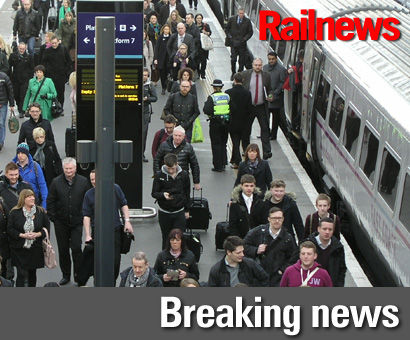REGULATED rail fares in England are set to rise by 1.9 per cent in January, after the RPI for July this year was announced this morning.
There has been a wave of protest from opposition politicians and consumer groups, who are pointing out that the potential rise has been revealed against a background of major disruption on Southern because of the continuing dispute over driver-only operation, while strikes have also been called on Virgin Trains East Coast in a dispute about job security.
Some of the protestors, such as the TUC, have also pointed out that fares have risen twice as fast as wages in recent years.
The RPI figure for each July is the usual base for rail fare increases in the following January.
Paul Plummer, the chief executive at the Rail Delivery Group, said: “Nobody wants to pay more to travel to work and at the moment in some areas people aren't getting the service they are paying for, and we know how frustrating that is. But increases to season tickets are set by government. For every pound paid in fares, 97p goes back into running and improving services and it’s our job to make sure that money is spent well.
"We need to sustain investment to build a modern railway, and money from fares helps us to do this, which is crucial with rail now more important to our nation's prosperity than at any time since the Victorian era. In many places our railway is full, with passenger numbers having doubled in two decades, and we know passengers and the country need better services."
However, Labour’s London Assembly transport spokesperson Florence Eshalomi said: “It’s no surprise the government are whacking up fares, but it will still come as a slap in the face for rail passengers. Southern Rail passengers have suffered some of the worst imaginable services in recent months, it’s nothing less than insulting to put up their fares.
“If the government aren’t prepared to take the Mayor’s lead and freeze fares, then they’ve got to get on with devolving those rail services. Passengers on London's suburban rail routes shouldn't be paying a penny more when the government is happily allowing them put up with a shoddy service.”
The Trades Union Congress and the Action for Rail campaign say fares have risen by 25 per cent since 2010, while average weekly earnings have gone up by 12 per cent.
TUC general secretary Frances O'Grady said rail passengers were 'paying more and getting even less'. She continued: "Fares go up while trains remain overcrowded, stations are unstaffed, and rail companies cut the guards who ensure journeys run smoothly and safely. It's time for rail services to be publicly owned, saving money for passengers and taxpayers alike."
However, rail minister Paul Maynard responded that the balance was now changing. He said: "Wages are growing faster than train ticket prices thanks to action by the government, and our commitment to cap regulated rail fares in line with inflation will save annual season ticket holders £425 on average in the five years to 2020."
The government has already pledged that each annual increase until 2020 will be no more than the rate of inflation as measured by the RPI. In recent times the formula has been RPI plus a further percentage -- most recently RPI +1 per cent -- which meant that regulated fares were increasing in real terms.
The likely rise in January will affect only regulated fares. Around half all fares are unregulated, which means that train operators can decide any changes for themselves, within reason. Regulated fares in Scotland and Wales are decided by the devolved governments.


